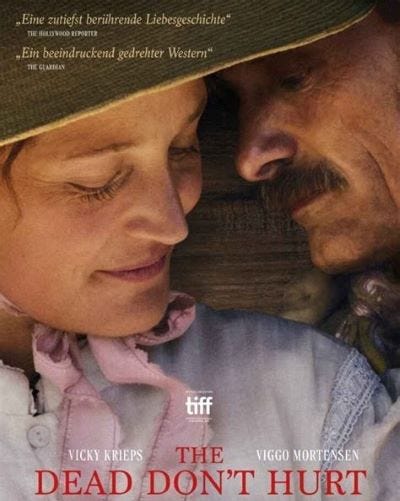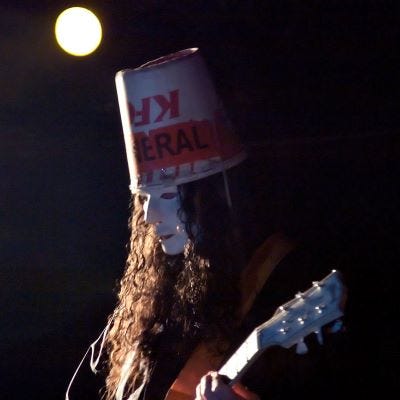The Dead Don't Hurt
Viggo Mortensen's Western has decent direction (by him) and not-great writing (by him).

The Dead Don’t Hurt (2023). Rating: C-
I like Viggo Mortensen. I like his acting, and his soft voice. I first noticed him playing a quietly menacing Lucifer in the very dumb (but entertaining) The Prophecy. I like that he took the Lord of the Rings part simply because his son was a huge Tolkein fan. I like the fact that he makes music with a well-respected avant-garde rock guitarist, Buckethead, who performs wearing this outfit:

Rock on, man.
I thought Mortensen was excellent in The Road, and in an odd, little-seen movie called Captain Fantastic, where he plays a super-left-wing isolationist in the middle of the woods. He’s both a loving dad and a bit of a staunch control freak in that one; it’s a terrific, complex performance.
So, I had high hopes for The Dead Don’t Hurt (despite it having a title that really belongs in a 1970s ultra-violent Italian western or something like that). Mortensen wrote this, directed it, and co-stars in it. And unfortunately, his script isn’t good enough. It’s not a stupid script. It’s just half full of really familiar material. And that’s the bad half.
There’s a good idea at the core. Mortensen plays a Danish immigrant in the American West, during the Civil War years. He meets a young French-Canadian immigrant (Vicky Krieps) who’s charmed by his grace and good manners; she’s being pursued by a boring high-society halfwit. (Mortensen IS originally Danish; Krieps is Luxemborgish/German; they both do their accents just fine.)
Krieps agrees to accompany him to his faraway famstead; which she is NOT impressed by, at first. It looks pretty bleak. But she likes Mortensen a lot, and is determined to try and improve the place.
Right as they’re getting settled in, a Union officer comes around asking for volunteers, and Mortensen decides to sign up. He’s inspired to serve his new country for a noble cause. And Krieps is furious with him — how dare he make that decision right as they’re beginning a life together? She still has feelings for Mortensen, so she’s gonna try and stick it out, but she’s angry and saddened by his decision.
Which she has a right to be! The Union cause WAS a noble one, but you don’t just leave your girlfriend alone on a broke-d**k rock farm in the middle of nowhere on a whim. And if he’d been contemplating this for awhile, surely it would be the right thing to talk about with your partner before you decide?
Still, we know that some well-meaning men DID do this sort of thing, and some gutsy women stayed behind to manage the farms/homes on their own. So, what’s the movie going to do with this? Is it going to show how Krieps uses her ingenuity to make a decent life for herself in the tiny rural outpost? How she weighs the decision of staying, as the war drags on and on?
Ah, no. She’s just gonna get raped and syphillised to death.
Unfortunately, that’s not a spoiler, either, since it’s all really telegraphed. The first scene is her death; the courtship and early life together on the farmstead are all flashbacks. And, we know there’s a violent louse in town who’s been making leering eyes at Krieps.
This is a terrible plot idea. Nobody can do anything about the louse, you see, because his dad is the richest landowner in town (Garret Dillahunt, utterly wasted), and the landowner pays off the corrupt mayor (Danny Huston, whose voice sounds more like dad John with every year, and who’s also utterly wasted in this part).
Maybe it’s a political allegory? The louse beats up a nice saloon piano player for playing a “Union” song; he hates/kills “Mexicans.” And nobody can stand up to him. If it’s a political allegory, it’s not an effective one.
The louse co-owns the bar with the great W. Earl Brown, here playing a sweet guy, but one who’s easily cowed by the louse. It’s stirring for a second to see Brown in this, for Deadwood fans… and Dillahunt, and Ray McKinnon. Yet they’re given virtually nothing to do. That’s more disappointing than if they weren’t in the movie at all. (When the louse was roughing up the piano player, I SO wanted Brown to sock the guy; Dan Doherty would have.)
And when Mortensen comes back from the war, and finds out that Krieps has a son by the rapist, and is told who the rapist was, he… goes to work for the corrupt mayor as sheriff? What? Huh?
I’d say we need more justification for what the characters do here, but the movie’s already a shade over two hours long to begin with. So, no. What we needed was a different script. Mortensen should have started with the one he wrote, then brought in a collaborator to tell him “the whole plot with the town corruption and the uncontrollable rapist/murder is awful, throw it out, let’s focus on what gutsy women did on their own when men went to war.” Or don’t even have him go to war! Just make a nice relationship movie about realistic life in a rural town of the era. About the hardships of surviving in a harsh dry climate.
There are plenty of good stories you can write about this sort of thing, and plenty of good movies have. The Emigrants/The New Land are about a family where the man’s happy to be in the middle of nowhere in America, because at least it’s HIS land… while the wife is rather bummed out by how stark their life is, but she makes do. Sweet Land is about a woman who emigrates to America because of a mail-order ad, and finds out how tough middle-of-nowhere farming is, but she makes do. It’s never a bad subject for a movie.
I think Mortensen wanted to make something vaguely feminist and vaguely political and vaguely character-driven and still have all the Western scenes he loved in old movies; the showdown, the disgusted sheriff turning in his badge, etc. Well, it doesn’t work. It’s too many elements and so the ones that are here don’t have enough depth to them.
How’s his direction? It’s fine. He doesn’t try to “style” things up, as some actors do when they try directing. He just lets cinematographer Marcel Zyskind do a nice, decent job. But part of a director’s job is identifying what’s wrong with the script and getting that fixed. And he doesn’t do it.
Plus, part of a director’s job is getting good performances out of the actors… and Solly McLeod is flat-out awful as the louse. That may not be his fault, it’s a poorly-written role. Still, he’s completely boorish and boring. When you think of Dillahunt’s monster bad guys in Deadwood, they were fascinatingly awful. He gave their awfulness a new spin (especially the more “refined,” far worse monster). McLeod can find nothing interesting to do here, or Mortensen can think of nothing interesting to give him to do.
There’s enough good in Mortensen’s filmmaking here that I’ll keep an eye out for movies he directs in the future. The way he handles the early relationship scenes is nice. But he needs to have more help, or more practice, on the writing side.
I will say this — Mortensen also wrote the musical score, and it isn’t bad! At times, when it’s just a lonely violin playing, it’s actually softly effective. Pretty and plaintive all at once. I don’t know any of his Rockin’ With Buckethead albums, but those violin bits here were quite nice.



